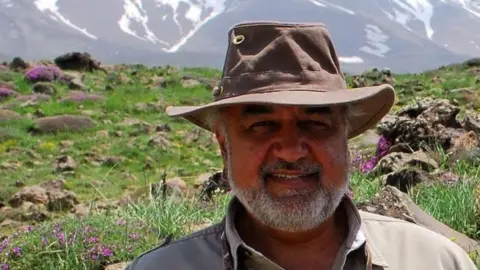Freeing Nazanin Zaghari-Ratcliffe took too long, Jeremy Hunt says
 PA Media
PA MediaIt took too long to secure the release of Nazanin Zaghari-Ratcliffe and Anoosheh Ashoori from prison in Iran, former foreign secretary Jeremy Hunt has said.
Mr Hunt told the BBC the British-Iranian pair's return to the UK last week was an "extraordinary achievement" but it should have happened faster.
He called for an independent inquiry into the issue.
Mrs Zaghari-Ratcliffe spent six years in detention on spying charges.
She was visiting her parents in Iran when she was arrested and has always denied the allegations.
Mr Ashoori, who was released at the same time, spent almost five years in detention on spying charges, which he also denied.
Mr Hunt, who was foreign secretary between July 2018 and July 2019, told BBC Radio 4's Today programme he did "everything I could" in his role to secure their release but "it took too long".
While he said the "primary responsibility" for their detention lay with Iran, the Conservative MP added: "I think we all have to say 'could we have done it faster?' And I think the answer is we could have."
However, he praised Foreign Secretary Liz Truss and the Foreign Office for negotiating the pair's release, describing it as "an extraordinary achievement".
On Monday, Mrs Zaghari-Ratcliffe took issue with ministers being given credit for her release, saying: "I have seen five foreign secretaries change over the course of six years. How many foreign secretaries does it take for someone to come home?"
Mrs Zaghari-Ratcliffe faced criticism from some commentators on social media, who suggested she should be more grateful to the British government for securing her freedom.
However, Mr Hunt defended her comments, writing on Twitter: "Those criticising Nazanin have got it so wrong. She doesn't owe us gratitude: we owe her an explanation."
Downing Street also said Mrs Zaghari-Ratcliffe should not face any abuse. The prime minister's official spokesman said: "As a UK citizen, someone in a free and democratic country, she is rightly able to voice her opinion on any topic she wishes."
Mr Hunt said Prime Minister Boris Johnson "deserves some credit" for authorising the payment of a £400m debt to Iran over a failed arms deal dating back to the 1970s.
Both the UK and Iranian governments have said the two issues should not be linked but Mrs Zaghari-Ratcliffe said she had been told by her captors that her imprisonment was connected to the unpaid debt.
Mr Hunt said there was initially "a lot of reluctance" over paying the debt when he started as foreign secretary because of fears it might be seen as a "ransom" and encourage more hostage taking.
"But this is not a ransom, it's a debt, and I think that decision that we should pay it in principle was taken when I was foreign secretary," he said.
He added that because Iran was under economic sanctions the practicalities of paying the debt "still took a long time to sort out".
 MORAD TAHBAZ
MORAD TAHBAZMeanwhile, Morad Tahbaz, who has British, Iranian, and American citizenship, remains in detention in Iran.
Mr Tahbaz, who was born in the UK, was doing conservation work when he was held in Iran in January 2018.
He and seven other conservationists were accused of collecting classified information about Iran's strategic areas under the pretext of carrying out environmental and scientific projects. All eight deny the charges.
His family say they had been told by the Foreign Office that Mr Tahbaz would be included in any deal to release hostages in Iran.
Mr Tahbaz, 66, was returned to custody last week after briefly being allowed out on furlough on the day Mrs Zaghari-Ratcliffe and Mr Ashoori were released.
His daughter Roxanne told BBC Breakfast her father, who has cancer, had been on hunger strike for three days.
Ms Tahbaz said it was "devastating" that she had not been able to see her parents for four years. Her mother is also unable to leave Iran because she is under a travel ban.
She added that the family hoped the UK government would "keep their promise" and "at the very least" secure an unrestricted furlough for her father and the lifting of her mother's travel ban.
Mr Hunt said Mr Tahbaz's continued detention was "absolutely disgraceful" and he accused Iran of "using an innocent person as a pawn in a diplomatic game".
He added that he suspected that because Mr Tahbaz was also an American citizen "the Iranians want something from the Americans before they're prepared to release him".
The Foreign Office said it was urgently raising Mr Tahbaz's case with Iran and that he must be allowed to return to his home in Tehran, "as the Iranian government committed to doing".
